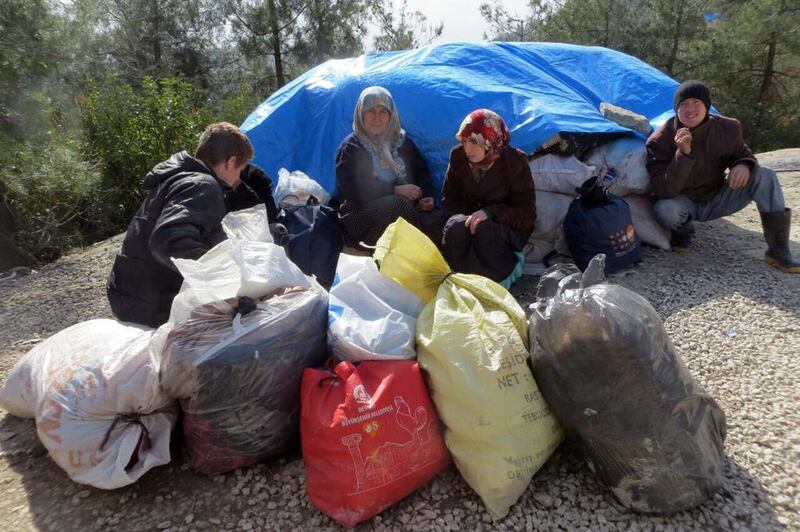BEIRUT // Up to 20,000 Syrians were waiting on the Turkish border on Friday after fleeing a major Russian-backed regime offensive near Aleppo where a new humanitarian disaster appeared to be unfolding.
It came as the main Syrian opposition’s chief negotiator said the group was unlikely to return to Geneva to take part in indirect peace talks because of Damascus and Russia’s “arrogant” and “merciless” bombardment campaign.
Tens of thousands of civilians have joined an exodus to escape fierce fighting involving government forces who severed the rebels’ main supply route into Syria’s second city.
On Friday, clashes between the two sides in and around Ratyan, a town near Aleppo, killed 120 people, said the Syrian Observatory for Human Rights, a Britain-based monitoring group.
The UN’s Office for the Coordination of Humanitarian Affairs (OCHA) said it estimated “up to 20,000 people have gathered at the Bab Al Salama border crossing and another 5,000 to 10,000 people have been displaced to Azaz city” nearby.
Sheikha Lubna Bint Khalid Al Qasimi, Minister of International Cooperation and Development and Head of the UAE Committee for the Coordination of Humanitarian Foreign Aid, said at a donor conference on Thursday that the international community needs to provide support to Syria’s neighbouring countries, which have received large numbers of displaced people since the start of the crisis.
The Syrian people lack the minimum basic necessities for life, she was quoted as saying by state news agency Wam, adding that “the international community needs to work together to formulate a common framework to deal with the crisis and strengthen cooperation channels and support capabilities of international humanitarian organisations”.
Since 2012 UAE humanitarian aid given to Syrians affected by the war has exceeded Dh2.2 billion.
Several countries have accused the Syrian government of sabotaging peace talks that collapsed this week with its military offensive. Saudi foreign minister Adel Al Jubeir said the government had refused to cooperate with UN envoy Staffan de Mistura.
On Friday, meanwhile, Nato head Jens Stoltenberg warned that Russian air strikes were “undermining the efforts to find a political solution”.
The Syrian Observatory, which relies on a network of sources on the ground, estimates that 40,000 people have fled the regime offensive near Aleppo.
OCHA spokeswoman Linda Tom said that in addition to the thousands at the border, another 10,000 people were estimated to have been displaced to the Kurdish town of Afrin, elsewhere in northern Aleppo.
“The fighting has also disrupted major aid and supply routes from the Turkish border,” she said.
Aleppo province is one of the main strongholds of Syria’s opposition, which is facing possibly its worst moment since the country’s brutal conflict began in 2011.
“The trajectory for the rebels is downwards, and the downwards slope is increasingly steep,” said Emile Hokayem, a senior fellow at the International Institute for Strategic Studies.
“The rebels are on the retreat everywhere.”
Turkish prime minister Ahmet Davutoglu said on Thursday that up to 70,000 people were heading to his country, which already hosts about 2.5 million Syrian refugees.
More than 260,000 people have died in Syria’s conflict and more than half the population has been displaced.
Aleppo city, Syria’s former economic powerhouse, has been divided between opposition control in the east and regime control in the west since mid-2012.
Syria’s army has been on the offensive since staunch government ally Russia began an aerial campaign in support of regime forces on September 30.
Since then, the regime has recaptured several key rebel towns in Latakia province – president Bashar Al Assad’s coastal heartland – and advanced in Aleppo province and in Daraa in the south.
The losses have angered and demoralised Syria’s opposition.
Mohammed Alloush, the main Syrian opposition’s chief negotiator and the political leader of powerful militant group Jaish Al Islam, said the opposition did not withdraw from the UN-sponsored proximity talks in Geneva because it “didn’t want to get blamed” for their failure. However, he said that they could not return to the negotiating table while the bombing continued.
Mr de Mistura announced on Wednesday that there would be a “temporary pause” in the indirect peace talks between the government and opposition, saying the process will resume on February 25.
Mr Alloush said that the Syrian government and Russia, who has been carrying out air strikes in support of its ally since September 30, were behind the failure of the talks.
“The political process will not be launched as long as Russia, the regime and Iran want to win militarily the battle on the ground,” he added.
Top diplomats from countries trying to resolve the conflict are set to meet again on February 11.
But tensions between them remain, with Moscow on Thursday accusing key opposition backer Turkey of actively preparing to invade Syria, a claim Turkish president Recep Tayyip Erdogan dismissed on Friday as “laughable”.
“Russia must be held accountable for the people it has killed within Syria’s borders,” Mr Erdoganw as quoted as saying by Turkey’s Dogan news agency. “By co-operating with the regime, the number of people they have killed has reached 400,000.”
Turkish prime minister Davutoglu had earlier accused Mr Al Assad’s supporters of “committing the same war crimes” as the regime.
The United Nations Security Council was scheduled to meet on Friday night for consultations with Mr de Mistura.
* Agence France-Presse, Associated Press





